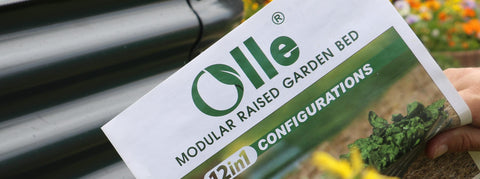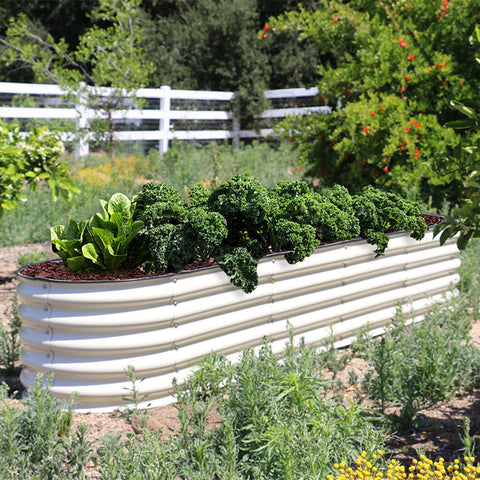Is the Galvanized Raised Garden Bed Safe
No matter how much gardening space you have, there are many ways to grow your favorite plants. You can plant indoors, outdoors, directly into soil, containers, or raised garden beds.
By definition, a raised garden bed is a customizable box that you can place on top of the garden soil. They help fight soil erosion, prevent weeds from exploding, and deter most pests. In addition, the raised garden bed has better drainage and easy back, which is very suitable for elderly gardeners or people with mobility difficulties.
Although many raised garden beds are made of wood, brick and rock, galvanized steel raised garden beds are becoming a very popular choice. So, is the galvanized garden bed safe? Now you will know what to keep in mind when using this material.

Is galvanization harmful to the environment?
Unfortunately, corrosion is a natural process that weakens metals. To prevent rusting, coat the metal with zinc to avoid this inconvenience. This process is called galvanization. Because zinc corrodes faster when exposed to electrolytes, it basically sacrifices itself for the benefit of the main metals, helping your elevated garden bed last longer.
Now, the main question is: Is galvanization harmful to the environment?
Zinc can be found in everyone, especially 1.4 to 2.3 grams for ordinary adults. Although zinc is a natural ingredient, heavy exposure can lead to stomach cramps, skin irritation, nausea and vomiting, and extreme cases can lead to respiratory diseases. Even small contacts in the workplace can make people feel infected with influenza.
In gardening, it is best to use rainwater. The use of water contaminated with zinc will increase the acid content in the water, which will enter our bodies by planting vegetables and fruits for consumption.
That is to say, although zinc corrodes faster, it takes a long time to reach the stage of stopping providing protection for metal. Zinc needs more than 50 years to corrode; As a result, it requires little additional energy and does not generate waste.
Zinc contributes to sustainable development, can be recycled, and has the least impact on the environment. The main concern is the cleaning after galvanizing to prevent zinc from polluting water bodies used for fish farming or aquatic crop consumption.
Is galvanized steel safe for the garden?
Yes, galvanized raised garden beds are safe if you maintain them to avoid zinc and metal leaching. As you know above, zinc is a natural ingredient that exists around us. However, high concentrations can cause some health problems.
After building or purchasing a galvanized raised garden bed, test the pH of the soil to ensure that the soil is not acidic. This is because acid soil will decompose zinc and increase the zinc content in the soil. Although a small amount of zinc can be used as a micronutrient, a large amount of zinc can be used in the crops you grow.
If your soil is acidic, add lime, wood ash, bone meal or ground eggshells to make it alkaline. Does this mean that you are doomed to plant alkaline plants on the galvanized elevated garden bed? No, of course not! You can use galvanized steel lined with plastic to grow acid loving plants such as blueberries, onions and hydrangeas.
Although galvanized sheet metal is said to last for decades, your raised garden bed is always exposed to elements. If you have been there for some time, about 15 years, please pay attention to rust.
If you find some rust, please do not panic. Instead, arrange your raised garden bed with greenhouse plastic or any other material that will drain well. This will provide a barrier between the soil and the rusty metal.

How to maintain them
As you know above, the biggest problem with using galvanized raised garden beds is cleaning and planting acid loving plants. If you use heavy plastic lining to avoid direct contact between acid soil and metal, your elevated bed will be good. Don't forget to add covers to improve the water holding capacity of the elevated bed.
If you do not use the galvanized elevated bed to plant acid loving plants, please do not plant them on the ground too close to the steel bed. This is because you may use acid based fertilizers to help them thrive, which will have a negative impact on your elevated bed.
Why are they so popular
Galvanized overhead garden beds are becoming more and more popular because they are very sturdy and resistant to damage. Some gardeners have switched from wood to galvanized steel beds, because unlike the former, they will not rot and can be used for decades if properly maintained.
In addition, the galvanized raised garden bed does not require too much maintenance! You can say goodbye to the trouble of oiling and painting them, and rest assured that they will not swell or shrink.
Contrary to popular belief, galvanized raised garden beds will not heat or bake your plants. The black container and flowerpot absorb heat, while the galvanized bed reflects heat. The soil on either side of the steel bed may be warmer than the center, but it's actually good for you, especially in spring.
Since the soil in the galvanized raised garden bed heats up faster than the soil on the ground, you can start planting crops and plants earlier than usual.
Steel bed
The raised garden bed is a perfect complement to any garden. They make the space look beautiful and tidy, and easy to DIY. You can customize them to fit anywhere in the yard. In addition, they can prevent pests, prevent weeds and help fight soil erosion.
